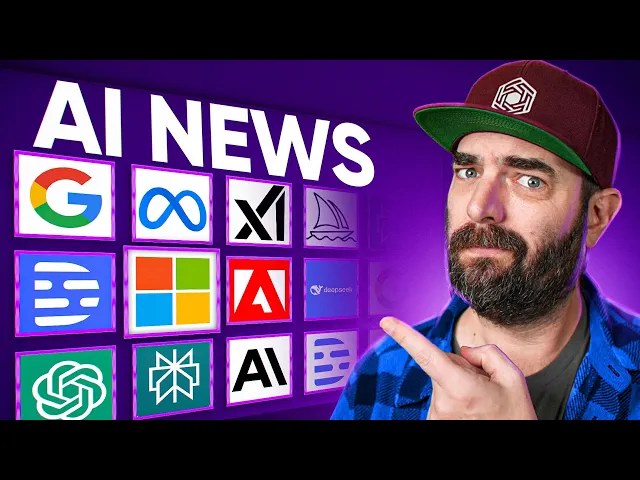Every Major AI Update This Week in One Video

OpenAI's latest moves signal major AI strategy shifts
In a week that demonstrates how quickly the AI landscape is evolving, OpenAI has made several strategic moves that reveal its complex positioning in the market. The company is simultaneously opening some technologies while creating new business relationships to protect its growth trajectory, showcasing the tension between democratization and commercialization that defines today's AI ecosystem.
Key Developments
-
Deep Research available on free plan – OpenAI introduced a "lightweight" version of its Deep Research feature to free users (limited to 5 uses monthly), while expanding usage for paid subscribers by creating a tiered access system to balance resource costs
-
Open model coming in June – OpenAI plans to release a downloadable, open model that can run locally and potentially call other closed APIs when needed, targeting performance superior to models from Meta and Deepseek
-
News partnerships expanding – The Washington Post has joined OpenAI's growing list of content partners, likely a defensive move to prevent future litigation as the company builds out search capabilities
-
Microsoft's relationship deepening – Microsoft continues integrating Copilot across its ecosystem with new agentic features and specialized tools like "recall" that leverage AI for productivity while addressing previous privacy concerns
Most Insightful Takeaway
The most telling development is OpenAI's planned open model release. This represents a significant strategic pivot that acknowledges the competitive threat from open-source models while attempting to maintain control of the AI ecosystem. By creating a model that can run locally but potentially call back to OpenAI's API for more complex tasks, the company is essentially building a "trojan horse" that keeps users in its ecosystem even when using supposedly independent technology.
This matters because it signals a recognition that the fully closed API model faces growing challenges as compute costs fall and open models improve. For businesses, this means planning for a future where basic AI capabilities become commoditized while specialized services remain premium offerings.
What They Missed
The video overlooked how these developments fit into the broader regulatory landscape. OpenAI's Washington Post partnership comes as the EU's Digital Services Act and other global regulations increasingly scrutinize AI companies' use of copyrighted material. These partnerships aren't just about preventing lawsuits but positioning to operate within emerging regulatory frameworks.
Additionally, OpenAI's strategy
Recent Videos
How To Earn MONEY With Images (No Bullsh*t)
Smart earnings from your image collection In today's digital economy, passive income streams have become increasingly accessible to creators with various skill sets. A recent YouTube video cuts through the hype to explore legitimate ways photographers, designers, and even casual smartphone users can monetize their image collections. The strategies outlined don't rely on unrealistic promises or complicated schemes—instead, they focus on established marketplaces with proven revenue potential for image creators. Key Points Stock photography platforms like Shutterstock, Adobe Stock, and Getty Images remain viable income sources when you understand their specific requirements and optimize your submissions accordingly. Specialized marketplaces focusing...
Oct 3, 2025New SHAPE SHIFTING AI Robot Is Freaking People Out
Liquid robots will change everything In the quiet labs of Carnegie Mellon University, scientists have created something that feels plucked from science fiction—a magnetic slime robot that can transform between liquid and solid states, slipping through tight spaces before reassembling on the other side. This technology, showcased in a recent YouTube video, represents a significant leap beyond traditional robotics into a realm where machines mimic not just animal movements, but their fundamental physical properties. While the internet might be buzzing with dystopian concerns about "shape-shifting terminators," the reality offers far more promising applications that could revolutionize medicine, rescue operations, and...
Oct 3, 2025How To Do Homeless AI Tiktok Trend (Tiktok Homeless AI Tutorial)
AI homeless trend raises ethical concerns In an era where social media trends evolve faster than we can comprehend them, TikTok's "homeless AI" trend has sparked both creative engagement and serious ethical questions. The trend, which involves using AI to transform ordinary photos into images depicting homelessness, has rapidly gained traction across the platform, with creators eagerly jumping on board to showcase their digital transformations. While the technical process is relatively straightforward, the implications of digitally "becoming homeless" for entertainment deserve careful consideration. The video tutorial provides a step-by-step guide on creating these AI-generated images, explaining how users can transform...
